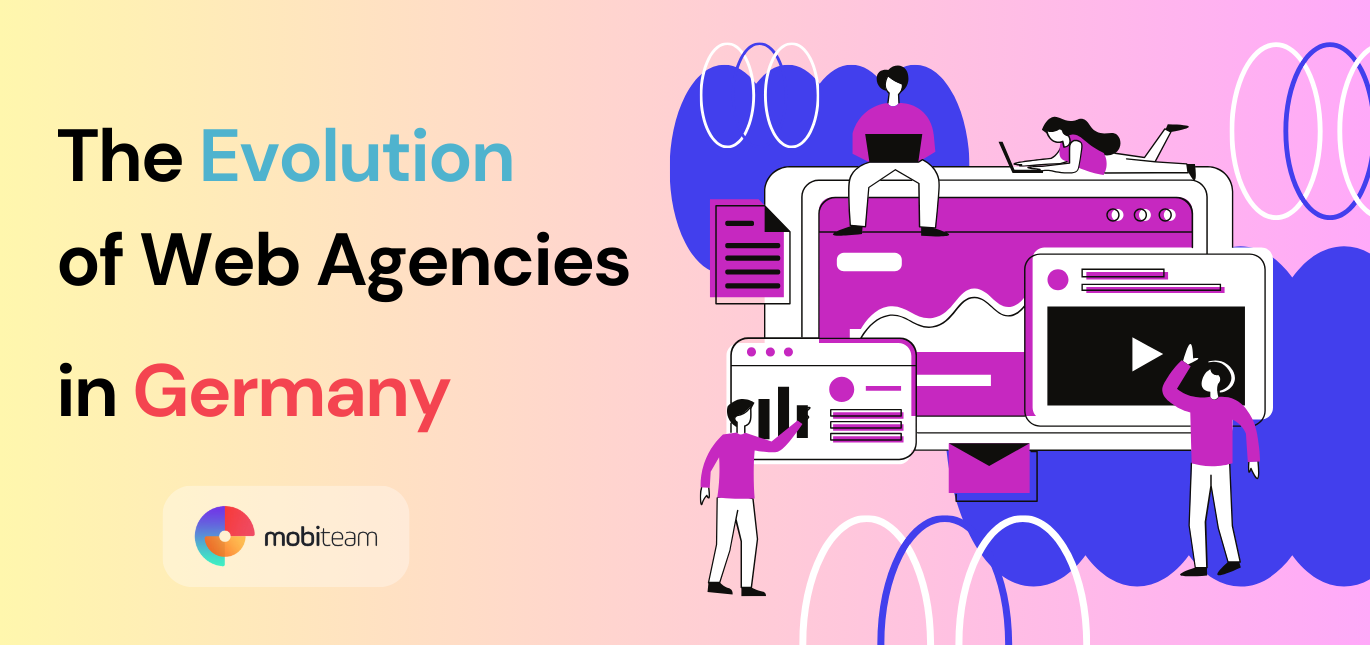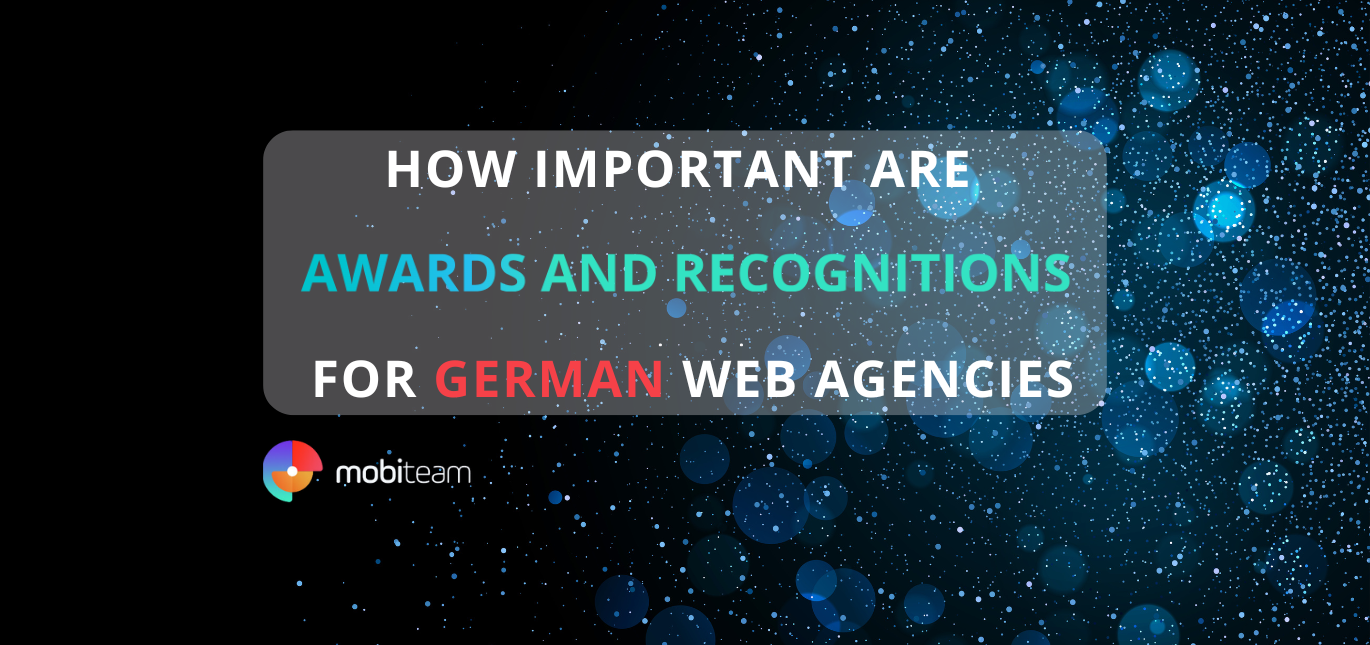The journey of web agencies in Germany illustrates a story of adaptability, technological advancement, and market insight. Over the past three decades, these agencies have transformed from small businesses focused on basic website design into large digital partners that drive overarching online strategies. Germany’s strong reputation for precision and innovation is obvious in its web agency map, which has consistently adapted to the evolving digital environment. From the early days of static HTML pages to today’s immersive digital experiences, the industry has charted a remarkable path of growth and diversification.

Back in The ‘90s
The 1990s marked the advent of web agencies in Germany, coinciding with the rapid expansion of the internet. During this period, agencies primarily focused on establishing online presences for businesses, which often involved simple, static websites. Companies such as SinnerSchrader, founded in 1996, were among the first to tap into this nascent market, recognizing the growing need for professional online representation. These early efforts were pivotal in introducing businesses to the digital realm, even though the tools and technologies available at the time were rudimentary by today’s standards.
The primary focus during this phase was usability. Websites were built with straightforward navigation and clear messaging, serving as digital brochures. For instance, German agencies often worked with SMEs to create basic informational websites that showcased services and contact information. This period also saw the rise of early content management systems (CMS) like TYPO3, which enabled companies to manage their content more effectively without extensive technical know-how.

The Early 2000
The 2000s brought both opportunities and challenges. The dot-com boom created a huge demand for web services, but this was followed by a market crash. Agencies that survived this tough time did so by expanding their services. They moved beyond basic web design to include e-commerce solutions, online marketing, and user-friendly interfaces. This change was important as businesses saw they needed to not only show their products but also sell them directly online.
Platforms like Magento and Shopware emerged as critical tools for e-commerce. Agencies adapted by hiring specialists who could create sophisticated online stores capable of handling large inventories and providing seamless user experiences. German agencies also began exploring SEO (Search Engine Optimization), understanding its importance in driving organic traffic to websites. The focus shifted from mere functionality to visibility and performance, setting the stage for today’s highly competitive digital marketplaces.

The 2010s
As technology advanced, so did the expectations from web agencies. The proliferation of smartphones and the rise of social media fundamentally altered how businesses approached their online strategies. Agencies had to evolve rapidly, incorporating mobile-first designs, app development, and social media marketing into their services. The 2010s also saw significant consolidation in the market, with larger firms acquiring successful agencies to bolster their digital expertise. For example, Accenture’s acquisition of SinnerSchrader in 2017 highlighted the strategic importance of web agencies in broader digital transformation efforts.
This era also marked a significant shift in how agencies positioned themselves. They became strategic partners, helping businesses align their digital initiatives with overarching goals. This required expertise in data analytics, content marketing, and user experience (UX) design. An example is the increased use of analytics platforms such as Google Analytics and Matomo to track user behavior and refine digital strategies in real-time. German agencies excelled in integrating these tools into their projects, providing clients with actionable insights that extended beyond website performance.

Additionally, this decade saw the rise of content-driven platforms. Agencies started offering services such as blog creation, video content production, and even interactive elements like quizzes and calculators.
The Present Day: Specialization and Innovation
By the 2020s, web agencies in Germany had become sophisticated entities offering specialized services. The focus has shifted towards creating personalized digital experiences, leveraging data-driven insights to engage users effectively. Agencies like Mobiteam are setting benchmarks by emphasizing sustainability in web design, building high-performance websites with reduced environmental footprints. This reflects broader societal shifts toward environmental consciousness, which have also influenced digital industries.
Moreover, the concept of “Experience Architecture” has gained traction. Agencies now aim to craft immersive brand experiences that go beyond traditional digital marketing. This requires not just technical expertise but also a profound understanding of consumer behavior and market trends.
Agencies are also exploring augmented reality (AR) and virtual reality (VR) solutions to create richer, more engaging user experiences. For instance, a German web agency might develop an AR tool for an automotive brand, allowing customers to visualize cars in their driveways using only a smartphone.
The Role of German Efficiency in the Market
Germany’s web agencies benefit from the country’s hallmark efficiency and emphasis on quality. Agencies are known for their expertise in WordPress solutions, and specializing in custom e-commerce platforms for example. Their ability to deliver tailored digital solutions has positioned Germany as a leader in the European digital services market.
Furthermore, Germany’s educational system contributes significantly to the industry’s success. Many agencies have access to skilled professionals trained in both technical and creative disciplines. Programs in digital media and computer science offered by universities such as RWTH Aachen and Technical University of Munich ensure a steady influx of talent.
Challenges and Opportunities
The growth in technology has been remarkable, but there are still obstacles to overcome. The fast changes in technology mean that individuals and businesses need to keep updating their skills and invest in new tools. Additionally, the competition is getting tougher, with companies from around the world entering the German market. To stay competitive, agencies should embrace new trends, like Web3 technologies and decentralized platforms, which have the potential to change how people interact online.
However, these challenges also present opportunities. The increasing demand for sustainable digital solutions and immersive experiences creates avenues for innovation. Agencies that can anticipate market trends and align their strategies accordingly will continue to thrive. For example, German agencies are beginning to explore the potential of blockchain in enhancing website security and transparency.
Final words
The evolution of web agencies in Germany is a testament to the industry’s resilience and ingenuity. From their humble beginnings in the 1990s to becoming indispensable partners in digital transformation, these agencies have demonstrated an ability to adapt and innovate consistently. The integration of cutting-edge technologies with traditional German precision has positioned the country as a leader in the global web agency market.





